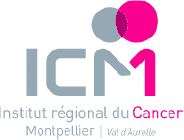Paris, le 21 septembre 2020 – L’édition 2020 du congrès l’ESMO (European Society of Medical Oncology), principal congrès européen de cancérologie aura lieu, virtuellement cette année, du 19 au 21 Septembre. Le nombre et la qualité des études présentées (8 présentations orales et de nombreux posters) démontrent la vitalité de la recherche d’Unicancer. Retrouvez toutes ces informations sur notre site.
High activity of Nivolumab in patients with pathogenic exonucleasic domain POLE mutated mismatch repair proficient advanced tumors.
We report here the initial results of nivolumab in the POLE exonuclease domain mutation cohort. The benefit of nivolumab seems restricted to patients with pathogenic mutations (ORR 50%) or with mutations with unknown significance (ORR 66%) observed mostly in mutated mismatch repair proficient (MMRp) advanced colorectal cancers (adenocarcinoma and high grade neuroendocrine) and endometrioid adenocarcinoma. AcSé Nivolumab POLE cohort reached its primary endpoint.
High clinical benefit rates of single agent pembrolizumab in selected rare sarcoma histotypes: First results of the AcSé Pembrolizumab study
Here we report the first results of pembrolizumab in the rare sarcoma cohort.
Pembrolizumab provides prolonged PFS in selected subtypes of rare sarcomas (chordoma (35%), alveolar soft-part sarcoma (ASPS, 58%), desmoplastic small round cell tumor (DSRCT, 8%), smarca4-malignant rhabdoid tumor (SMBT, 62,5%)).
Results of the randomized, placebo (pla)-controlled phase ii study evaluating the efficacy and safety of regorafenib (rego) in patients (pts) with metastatic relapsed ewing sarcoma, on behalf of the french sarcoma group (fsg) and unicancer
REGOBONE is non-comparative phase 2, double-blind, PL-controlled trial designed to evaluate the activity and safety of regorafenib, in 5 independent cohorts of sarcoma originating in bone. Results for the Ewing Sarcoma cohort show that, despite a PFR at 8 weeks lower than expected, this randomized non comparative study shows a promising signal of benefit of regorafenib in relapsed Ewing Sarcoma, with a median of PFS of 11.4 weeks, and a moderate toxicity.
A safety study of Nivolumab in Patients with Recurrent and/or Metastatic Platinum-refractory Squamous Cell Carcinoma of Head and Neck: Final analysis
In the randomized phase III Study TOPNIVO, Nivolumab demonstrated significant overall survival benefit with favorable safety profile for platinum refractory R/M SCCHN. The objectives of the current study were to provide additional insights into the frequency of high-grade adverse events related to Nivolumab and the efficacy of Nivolumab in real life.
The final analysis of the TOPNIVO study shows no additional toxicities of Nivolumab compared to what has been described previously, confirms the previous results in terms of efficacy with new data for prognostic factors.
PRODIGE 23 (C. BORG) Neoadjuvant mFOLFIRINOX and preoperative chemoradiation (CRT) versus preoperative CRT in patients with T3-4 rectal cancer: Surgical and quality of life results of PRODIGE 23 phase III trial.
Prodige 23 investigated the role of neoadjuvant mFOLFIRINOX before preoperative chemoradiation (CRT), with TME-surgery and adjuvant chemotherapy (CT) in resectable locally advanced rectal cancer.
This study is a phase III multicenter randomized clinical trial. Eligible patients had cT3 or cT4, M0 rectal adenocarcinomas <15 cm from the anal verge, age 18-75 years, and WHO PS ≤1. Primary endpoint was 3-year disease free survival (DFS). Secondary endpoints were ypT0N0 rate, OS, metastasis-free survival (MFS) and QoL.
431 patients were randomly assigned in 2 Arm A/B. In Arm A, patients received preop CRT (50 Gy, 2 Gy/fraction [fr]; 25 fr + capecitabine), surgery, then adjuvant CT for 6 months. In Arm B, patients received 6 cycles of mFOLFIRINOX every 2 weeks, followed by the same preop CRT, surgery and 3 months of adjuvant CT. Adjuvant CT consisted of mFOLFOX6 or capecitabine, depending on the centre’s choice for all patients.
Neoadjuvant mFOLFIRINOX plus CRT is safe, preserves the quality of resection and significantly increased ypCR rate, DFS, and MFS. Patients treated with neoadjuvant chemotherapy had more symptoms during chemotherapy, but benefits from longer time to QoL deterioration for rectal functional outcomes.
Kidney ccRCC Immune Classification (KIC) enhances the predictive value of T effector (Teff) and angiogenesis (Angio) signatures in response to Nivolumab (N)
The NIVOREN GETUG-AFU 26 study reported safety and efficacy of Nivolumab in metastatic renal cell carcinoma (mRCC) patients. A translational research program including gene expression signatures was launched to identify biomarkers for outcome to Nivolumab.
Conclusion : We report for the first time from a prospective trial that Immune high/angiogenesis and stromal low signatures likely predict nivolumab efficacy in mRCC patients.
Longitudinal Evaluation of Serum Assessed Non-Adherence to Tamoxifen (TAM) among Premenopausal Patients (pts) in the prospective multicenter CANTO cohort
Non-adherence to long-term treatments is often under recognized and a gold standard for its assessment does not exist. In patients with hormone-receptor-positive breast cancer, non-adherence to adjuvant endocrine therapy is associated with poorer survival and increased health-care costs.
CANTO COMPLETE, a sub study of CANTO cohort, evaluates prevalence and predictors of non-adherence to adjuvant endocrine therapy in premenopausal pts at several time points from treatment initiation using drug serum levels and pts’ self-declarations.
In this study, Barbara Pistilli et al. showed that serum assessment was able to identify a higher proportion of pts who have dropped out from treatment early. We previously demonstrated that 1 in 6 premenopausal patients with early breast cancer (EBC) are non-adherent to TAM at 1 year from treatment initiation. Here we show that at year 3 from initiation of TAM, more than 1 patient out of 3 was poorly adherent to adjuvant TAM, showing that non-adherence sharply increased from Y1 to Y3. Consistently with our previous findings, almost half of them do not overtly declare non-adherence. We also identified some baseline tumor and patients’ behavioral features and some toxicities at year 1 that are associated to non-adherence at year 3.
Non-adherence to oral medication remains a major concern in the care of patients with cancer. Understanding causes of non-adherence in women with early breast cancer may represent the first step for designing interventions to optimize adherence and improve breast cancer outcomes.
Long-term patient reported outcomes (PRO) and hematologic toxicity among patients (pts) who received Granulocyte-Colony Stimulating Factors (G-CSF) during chemotherapy (CT) for early breast cancer (EBC)". P Lapidari et al.
Activation of inflammation is well known with the use of G-CSF. Although G-CSFs are overall well-tolerated, short-term side-effects of G-CSF were reported in early breast cancer, including bone pain and transitory leukocytosis and thrombocytopenia. However, few data exist on the long-term effects of G-CSF on quality of life and hematological toxicity.
From the prospective CANTO study data, Pietro Lapidari et al. assessed associations between G-CSF utilization during (neo)adjuvant chemotherapy for early breast cancer and long-term variation in Quality of life PROs, particularly pain, and hematologic toxicity.
Although warrant caution when interpreting these findings, notably in relation to some baseline differences and selection bias, G-CSF seemed overall well-tolerated, with no major long-term impact on PRO and hematologic toxicity. This is the first large study assessing long-term and late associations of G-CSF use in early breast cancer.




